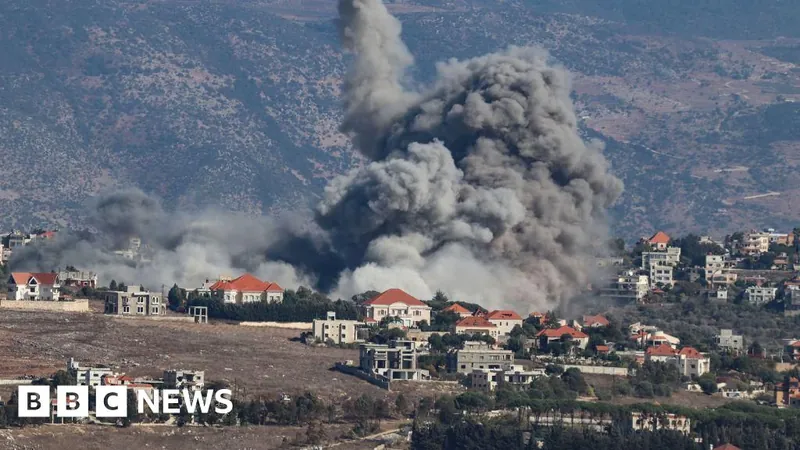
Israel Intensifies Strikes Against Hezbollah Amid Rising Ceasefire Tensions
2024-09-26
Overview of the Conflict
Israeli Prime Minister Benjamin Netanyahu has instructed the military to continue operations against Hezbollah "with full force," disregarding mounting pressure from the US and other allies for a ceasefire. This confrontation has escalated significantly, resulting in tragic consequences on both sides.
Casualties and Humanitarian Impact
On Thursday, Lebanon’s health ministry reported at least 92 fatalities due to Israeli airstrikes, with hundreds more casualties recorded since hostilities surged earlier in the week. The situation reached a critical point when Hezbollah confirmed that an Israeli strike took the life of Mohammad Surur, the leader of its drone unit, in a southern Beirut apartment building.
Rise in Tensions
Tensions are peaking as fears of an all-out war grow, particularly following a series of aggressive strikes on Lebanon that began Monday. In what seemed like a moment of hope, Israeli ambassador to the UN, Danny Danon, initially indicated a willingness to consider ceasefire proposals. However, such proposals were swiftly dismissed by Israeli legislators as Netanyahu, in New York for the UN General Assembly, firmly declared that Israel would "not stop until all goals are achieved," specifically referencing the safe return of northern residents to their homes.
International Reactions
Despite the White House asserting that the ceasefire proposal was "coordinated" with Israel, Netanyahu's later comments suggested a stark contradiction, reaffirming the military's offensive operations.
Impact on Civilians
The humanitarian toll of the conflict is clear; around 70,000 Israelis have been displaced from northern regions since the flare-up began last year, sparked by the ongoing war in Gaza. Meanwhile, UN estimates indicate that roughly 90,000 people have fled their homes in Lebanon since Monday, compounding a pre-existing crisis where 110,000 had already been displaced.
Military Developments
The Israeli military has targeted Hezbollah positions in southern Lebanon and the Bekaa Valley and has conducted airstrikes on strategic infrastructure along the Lebanese-Syrian border aimed at disrupting weapons supply lines to Hezbollah.
Hezbollah's Retaliation
In retaliation, Hezbollah has launched 50 rockets into the Kiryat Ata settlement and directed 80 missiles towards the city of Safed, both located in northern Israel. Israeli Army Chief Lt. Gen. Herzi Halevi hinted on Wednesday that ongoing airstrikes could set the stage for ground incursions into Lebanese territory, with the Israel Air Force Commander Maj. Gen. Tomer Bar urging troops to be ready for potential ground operations.
Call for De-escalation
International voices are also growing louder, with Qatar calling for de-escalation. Government spokesman Majed al-Ansari expressed grave concerns over reports from Lebanon detailing the devastating effects of the strikes on civilian families.
US Involvement
Meanwhile, US Defense Secretary Lloyd Austin, after discussions with British and Australian counterparts in London, warned that the situation teeters on the brink of "an all-out war," but he emphasized that a diplomatic resolution remains an option. “The quickest way to restore security and enable residents to return home is through diplomacy,” Austin asserted.
Military Aid and Future Prospects
In the midst of these military actions and diplomatic maneuvers, Israel’s defense ministry announced it has secured an $8.7 billion aid package from the US to bolster military efforts. This package includes $3.5 billion for essential wartime procurement and $5.2 billion earmarked for air defense systems, such as the Iron Dome and advanced missile defense technologies.
Conclusion
As the conflict continues to unfold, the prospect of a diplomatic solution appears increasingly urgent amidst rising casualties and humanitarian crises on both sides. How will this escalating conflict shape the future of regional stability? Stay tuned for updates!





 Brasil (PT)
Brasil (PT)
 Canada (EN)
Canada (EN)
 Chile (ES)
Chile (ES)
 España (ES)
España (ES)
 France (FR)
France (FR)
 Hong Kong (EN)
Hong Kong (EN)
 Italia (IT)
Italia (IT)
 日本 (JA)
日本 (JA)
 Magyarország (HU)
Magyarország (HU)
 Norge (NO)
Norge (NO)
 Polska (PL)
Polska (PL)
 Schweiz (DE)
Schweiz (DE)
 Singapore (EN)
Singapore (EN)
 Sverige (SV)
Sverige (SV)
 Suomi (FI)
Suomi (FI)
 Türkiye (TR)
Türkiye (TR)